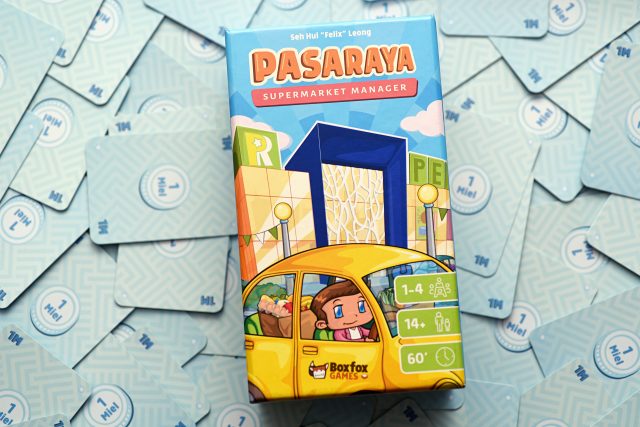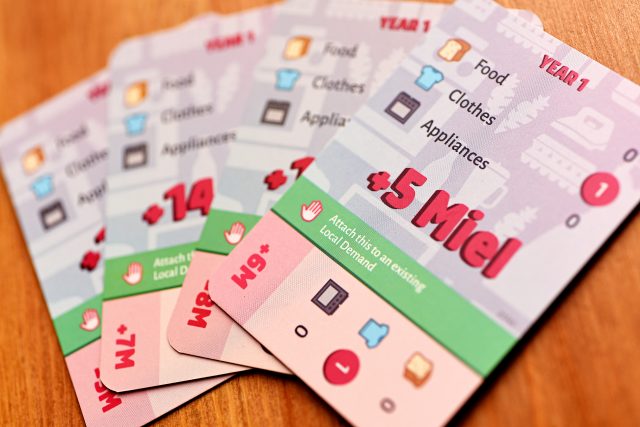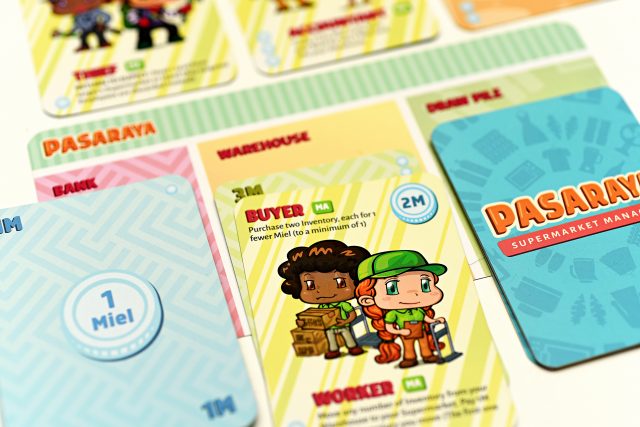Back in high school, I worked part-time in a department store. There wasn’t anything particularly exciting or interesting about it, perhaps because I was on the lowest of the low rungs in the organization. Pasaraya: Supermarket Manager takes you to the heights of running your own supermarket for fun and, well.. mostly profit, let’s get real. A cheerful looking deck-builder in wonderful packaging, Pasaraya may have some surprise ingredients in store for long-term deck-builder fans, and not just due to the fresh theme.
Pasaraya has you setting up and running your supermarket – from purchasing inventory and hiring staff, to keeping an eye on sales forecasts to see what might sell, and if current market prices might be worth selling off your inventory to make bank. Thematically, I really think this hits the mark as far as a deck-builder – designer Seh Hui “Felix” Leong was inspired by theme first, after all! After hearing the Dice Tower’s Tom Vasel talk about unusual themes he’d like to see in games – specifically, running a supermarket – Leong was inspired, eventually creating what became Pasaraya.
 The big stand-out in this game compared to many deck-builders I’ve played, is that your money spent is money gone. (Too real.) If you’re hiring staff or purchasing inventory, that’s money back out into the whole system of the game, thinning down your deck. Of course, the idea is to have some cash flowing back toward you, and whenever you manage to sell inventory or fulfill the needs of the market with a sales forecast, money will be deposited into your bank (a deck that sits aside, mostly untouched for the game). Having this extra deck to consider is one of the really intriguing things in Pasaraya for me; I can withdraw small amounts to inject some cashflow into my main deck, and help grease the wheels of my supermarket when I need to, but hopefully get to the point where I can let it pile up for scoring game end points.
The big stand-out in this game compared to many deck-builders I’ve played, is that your money spent is money gone. (Too real.) If you’re hiring staff or purchasing inventory, that’s money back out into the whole system of the game, thinning down your deck. Of course, the idea is to have some cash flowing back toward you, and whenever you manage to sell inventory or fulfill the needs of the market with a sales forecast, money will be deposited into your bank (a deck that sits aside, mostly untouched for the game). Having this extra deck to consider is one of the really intriguing things in Pasaraya for me; I can withdraw small amounts to inject some cashflow into my main deck, and help grease the wheels of my supermarket when I need to, but hopefully get to the point where I can let it pile up for scoring game end points.
Sales forecasts are what really drives your inventory strategy, and what to stock in order to make money. It’s a steady stream of new demands each round, and seeing what you can best do to turn your stock into $$ motivates your choices. Thematic choices for actions pop up here nicely, too – inventory purchased has to pass through your warehouse (aka your discard pile) before it can be stocked. Staff can be placed on “standby” in your supermarket so you have them waiting to use rather than relying on cycling through to them in your deck – and when you do take advantage of their actions, they head back to the warehouse too, for a little “break”! Once you get the hang of actions, the flow of the game is pretty smooth.
 I found the staff cards to work really well, even though I was worried about their double-uses (for example, one card can be used as a supervisor to peek at the top of your deck or as an accountant to withdraw money from your bank in a less deck-clogging denomination). It’s a nice way to have options in your deck without having to churn through to find a particular person too much. I liked the bonuses that each of the staff provided and it certainly boosted turns that might be otherwise dull and a slow burn. There is a take-that aspect among the staff cards with the “thief” – there are some things to help balance this out (you can provide security protection with staff cards, and once a thief is used it goes back to the main supply rather than into discard to be used again too soon), but I’d suggest skipping these as an option if you’re not into it (there’s even a house rule in the Board Game Geek forums for Pasaraya that suggests this!). Interestingly, one of the current prices cards (setting market value for the sale of inventory) has a little event on it that allows for “insurance” for players being stolen from (that is, free money!). Perhaps this could be a house rule if not removing thievery entirely. However, overall it wasn’t a game-ruiner for me.
I found the staff cards to work really well, even though I was worried about their double-uses (for example, one card can be used as a supervisor to peek at the top of your deck or as an accountant to withdraw money from your bank in a less deck-clogging denomination). It’s a nice way to have options in your deck without having to churn through to find a particular person too much. I liked the bonuses that each of the staff provided and it certainly boosted turns that might be otherwise dull and a slow burn. There is a take-that aspect among the staff cards with the “thief” – there are some things to help balance this out (you can provide security protection with staff cards, and once a thief is used it goes back to the main supply rather than into discard to be used again too soon), but I’d suggest skipping these as an option if you’re not into it (there’s even a house rule in the Board Game Geek forums for Pasaraya that suggests this!). Interestingly, one of the current prices cards (setting market value for the sale of inventory) has a little event on it that allows for “insurance” for players being stolen from (that is, free money!). Perhaps this could be a house rule if not removing thievery entirely. However, overall it wasn’t a game-ruiner for me.
Most of what I’ve been talking about applies to gameplay and goals of the game overall, but the base rules you’d play out of the box are just the “manager driven mode”! You play out your turn by taking actions, and perhaps boosting or adding to them with staff abilities (aka the cards mentioned above). You can get by on a skeleton staff in this mode if you really want to, but would do better relying on abilities. After a few games in this mode, I switched to the “employee driven mode” which switches things up a little – the game setup and progress is the same, but instead of a wide range of actions inherent to the player’s turn, you have things somewhat restricted, and use staff cards to drive actions. This, to me, certainly felt like it required more planning, and staff cards did run low throughout the game as people snapped them up to create a well-oiled machine. I found it interesting that there are essentially two games in one here – and once you add the solo AI to this, it feels like almost too much to choose from. When playing solo, the AI deck will simulate an opponent stocking goods and selling, and at the same time throwing some randomness of events into the mix that will affect your game – you can throw the AI deck into a 2+ player game too, if you want that dash of unpredictability; I’d rather it just be between me and the AI when the marketplace is a rollercoaster.
 So, I’ve been wheeling this cart around the isles, browsing and picking up a few things to mark off my list – just the necessities, sprinkled with a little love for the oddball theme of this game. Overall, I really think it’s a terrific stab at a fresh take on deck-building, and it’s just a delight to sit down and play a card game that isn’t all grimdark fantasy and doesn’t feel too much like Dominion for a change. The game feels a little long for its light-feeling theme, but I don’t know that it’s a deal-breaker – especially seeing as I’ve used a house rule to shorten the game’s deck (aka the amount of sales forecasts that will drive the game) and that helped. But then, maybe you need that build-up over more rounds for the vibe of Pasaraya to hit for your group. If you’re interested in the full management side of the game, then dig on into that full game deck! I’m not sure that tinkering further (for instance, buying inventory straight onto the floor) would work to shorten things, or just straight up break things. So something simple like shortening the deck works when I do want to finish in under an hour, for instance.
So, I’ve been wheeling this cart around the isles, browsing and picking up a few things to mark off my list – just the necessities, sprinkled with a little love for the oddball theme of this game. Overall, I really think it’s a terrific stab at a fresh take on deck-building, and it’s just a delight to sit down and play a card game that isn’t all grimdark fantasy and doesn’t feel too much like Dominion for a change. The game feels a little long for its light-feeling theme, but I don’t know that it’s a deal-breaker – especially seeing as I’ve used a house rule to shorten the game’s deck (aka the amount of sales forecasts that will drive the game) and that helped. But then, maybe you need that build-up over more rounds for the vibe of Pasaraya to hit for your group. If you’re interested in the full management side of the game, then dig on into that full game deck! I’m not sure that tinkering further (for instance, buying inventory straight onto the floor) would work to shorten things, or just straight up break things. So something simple like shortening the deck works when I do want to finish in under an hour, for instance.
I think some of this is a symptom of a newcomer designer who self-published – and not to say that negatively, either! It’s worth considering for the context of this game that, despite thorough playtesting things still could use polish. I did appreciate that, when I popped onto BGG for some rules clarifications, there was an official errata thread for rules and cards that was enormously helpful – Leong is definitely happy to interact with his audience in that regard. Hopefully folks know to look for these for help. Production-wise the game is fantastic – cards aren’t flimsy (but the matt finish makes shuffling tough), art and graphic design are married well to present a cheerful package of fun – and it’s really got that vibe, especially with jokes peppered throughout text and packaging. I must say, it begs for a playmat as many deck-builders do – perhaps one day if the game finds distribution and a larger audience.
 If you’re like me, and love seeing what people are doing with fresh ideas and creativity to spice up a well-trodden format of a game, you’ll love digging into the retail world that Pasaraya has to offer. Theme can make a game pop, and it’s encouraging to see people stretching their legs into new territory there. Perhaps next time we’ll see Pasaraya: Mall Manager! Shop on, friends.
If you’re like me, and love seeing what people are doing with fresh ideas and creativity to spice up a well-trodden format of a game, you’ll love digging into the retail world that Pasaraya has to offer. Theme can make a game pop, and it’s encouraging to see people stretching their legs into new territory there. Perhaps next time we’ll see Pasaraya: Mall Manager! Shop on, friends.
—
Pasaraya: Supermarket Manager is a game of running a supermarket via deckbuilding for 1 – 4 players taking approximately 60-90 minutes to play. Designed by Seh Hui “Felix” Leong, with art by MeowGod, it’s self-published through Box Fox Games – you can find out about ordering it here. Thank you so much to Felix for sending the DWP crew a copy of the game to try, it’s been a fantastic experience!
You may never see “Pasaraya : Mall Manager” (at least not under that exact title) because the word “Pasaraya” means “Supermarket” in Malay ?
Thanks for the review though. Now I know it has an automa for solo play, I’ll be picking one up at my FLGS and support a local game designer ?